
Shogun, a programme about a man who's so bad at boats he crashes into Japan, is the best thing on television right now. Feted with glowing reviews and hotly discussed around water coolers the world over, it seems set to join that pantheon of shows that your most annoying friend (me) constantly asks if you've gotten around to watching yet. You haven't. You still need to get round to Succession, and The Sopranos, and The Wire, and Better Call Saul.
But today's Shogun isn't the only adaptation of the original 1975 novel. Back in the '80s, the world was in the grip of Shogun-mania: There was a nine-hour miniseries (featuring Toshiro Mifune!), a Broadway musical which audiences reportedly found mystifying, and—here's where it gets relevant for you and me—two videogame adaptations.
Here's the thing: Shogun is a sprawling and politically ambitious novel that tells a story of family intrigue, warring daimyōs, and the clashing and intermingling of cultures. The videogames of the '80s were largely about a little yellow head that ate ghosts. Marrying the message to the medium was a toughie, but devs still tried. Twice. In 1986 and 1989. I salute their ambition and, having now played both, I will never forgive them. Here's my report to the Emperor.
James Clavell's Shogun (1989, Infocom)
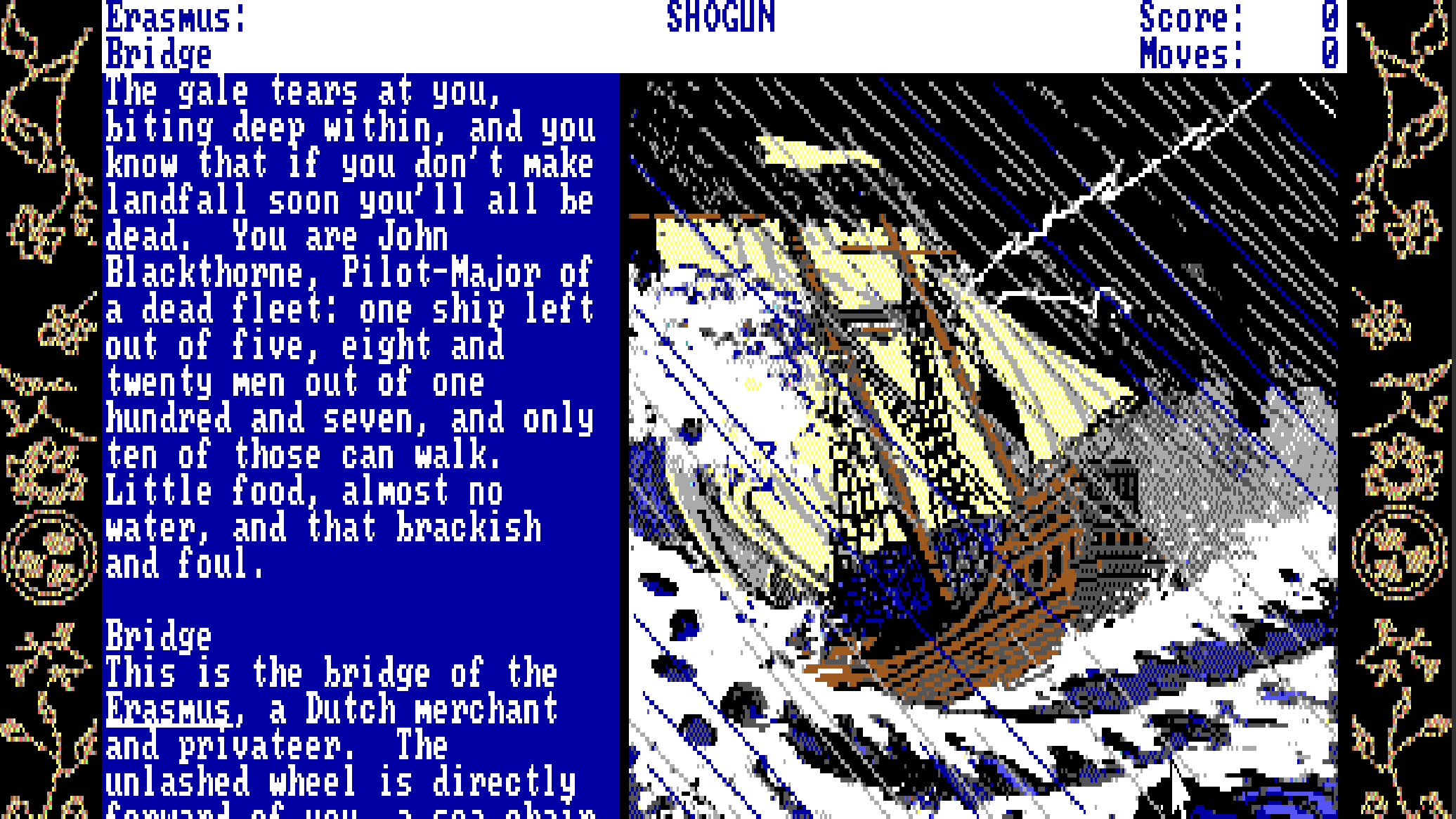
We're starting with the later game because it's the one that makes sense, and I'm still in a period of psychic convalescence from my experience of the one from 1986. This one's a text adventure, which is like a book you can talk back to, and came out of Infocom toward the end of the decade.
Imagine my excitement. I love a good text adventure; my entire adolescence was spent roaming the ASCII halls of Achaea, Dreams of Divine Lands, an entirely text-based multi-user dungeon (MUD) that somehow survives to this day. Text adventures understood that everyone on Earth yearns to interact with their environment through an arcane toolset of verbs: GO NORTH, GRAB KEY, that kind of thing.
And what Infocom's Shogun understood even better is that what fans truly desire is to live out the events of the book to the letter, and to be punished with swift death if they diverge from Clavell's text in the slightest. The game—such as it is—takes place over a bunch of barely connected scenes. You start out as Shogun protagonist Blackthorn as he has a very bad day on his boat. His crew are mostly dead and his ship is lost in a tempestuous sea; the only reason the remainder of his men haven't mutinied is that they're all wracked with scurvy, exposure, and deprivation.
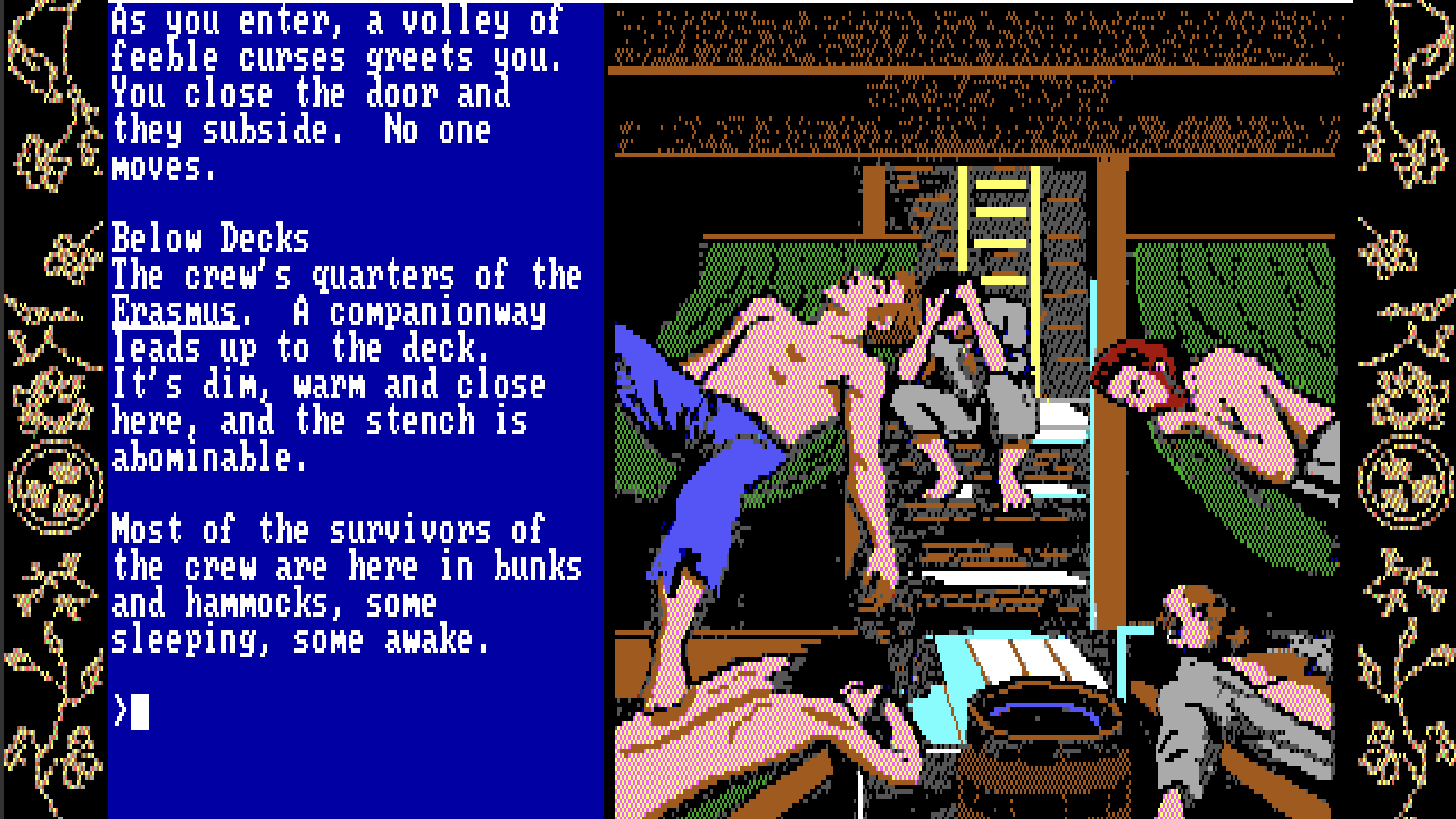
I know what you're thinking: "That's just like James Clavell's excellent novel Shogun! What a great opportunity to explore its world and characters, to make interesting decisions and enlightening discoveries about a world I loved on the page."
No, you fool, you imbecile. How could you even begin to think that? Your role in Infocom's game is to become a kind of Shogun speedrunner: honing yourself into a perfect instrument whose sole purpose is to navigate the book's plot in the most hyper-efficient manner possible. To dilly-dally is death. Want to chat with a crewmate? Death. Want to read your diary? Death. Want to take a second look at the room you're in? That's fine. No, just kidding. It's death.
Want to chat with a crewmate? Death. Want to read your diary? Death. Want to take a second look at the room you're in? That's fine. No, just kidding. It's death.
It's pure trial and error. Your only real objective is to find the precise series of inputs to end up crashed on the beaches of Japan, and any deviation from the most optimum course moves a hidden timer inexorably forward toward your demise. What should be a fun opportunity to explore a novel's world from a new perspective becomes a grim experiment in videogame Taylorism: set your nose to the grindstone of finding the most efficient route through this scene from the book. Or die. Dying is an option too.
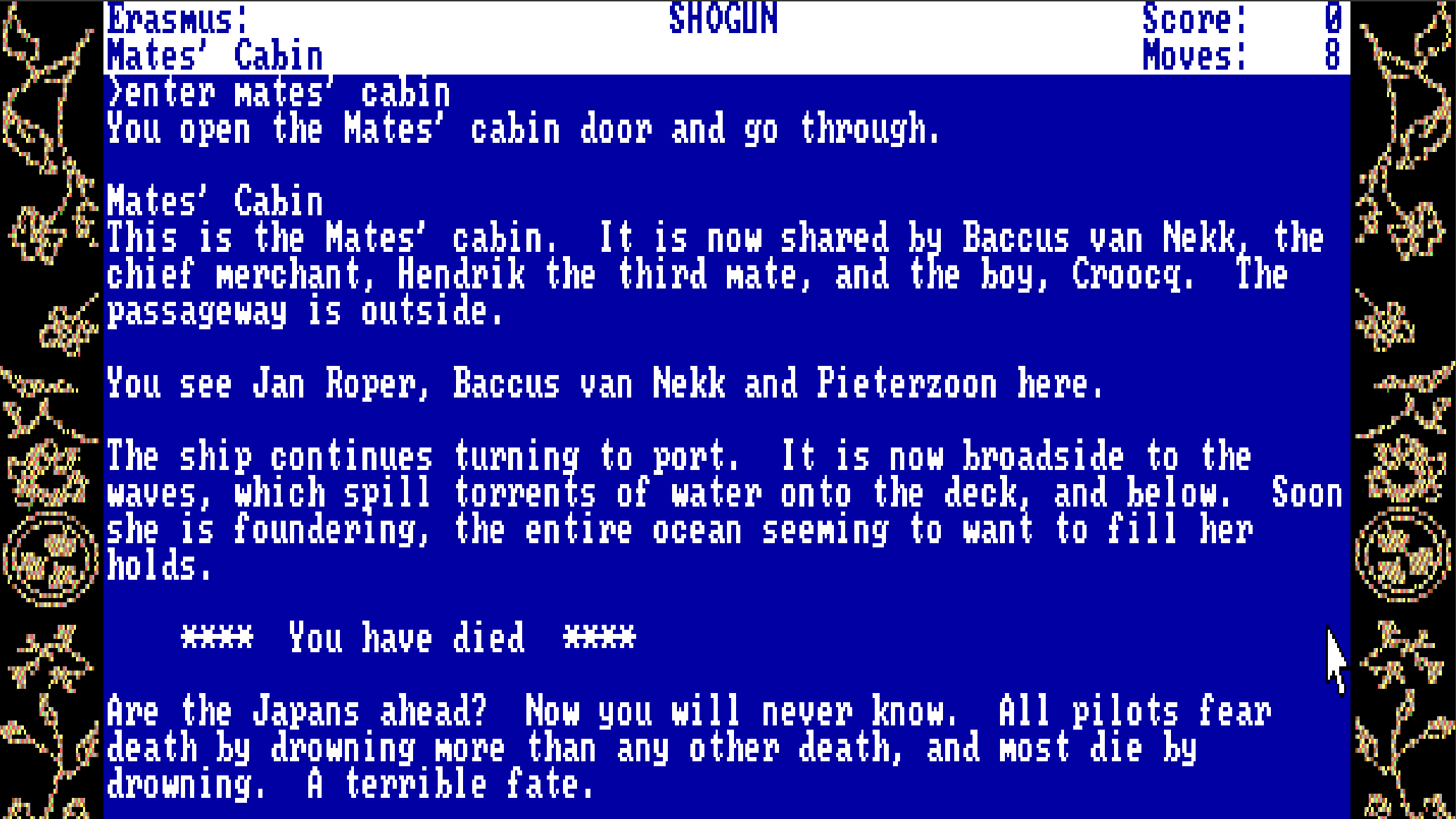
Or at least, this was my experience for the couple of hours or so I spent with the game. I admit, I got hardheaded. I was determined for most of it to chart an honest course through whatever the hell it was the game wanted me to do: straighten the ship's course, lash the wheel, get my nearly-dead crew to do their jobs, inexplicably have a confrontation about apples, and so on. It was only when I died for the 17th time or so that I threw my hands up and used the game's hint system (which it encourages you not to do), at which point it mocked me for asking a question—which it had listed in its hints menu—about my pet rat.
So I gave up on that and turned to an online walkthrough, and thank god, because there's absolutely no way I would have ever stumbled upon the correct series of inputs myself. We're talking a "turn port once, wait three turns, then turn starboard four times" level of convolution here.
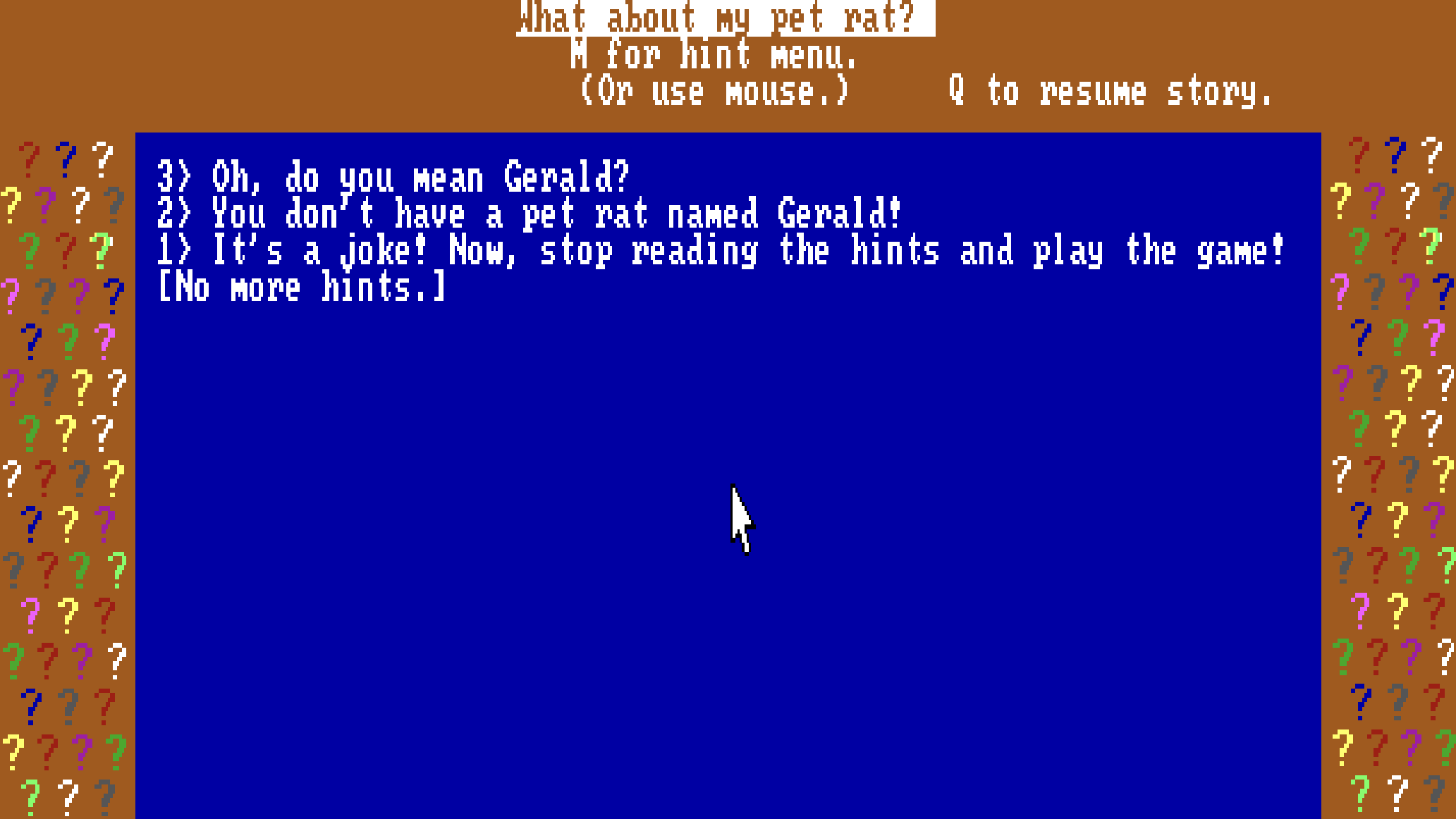
Anyway, being told exactly what to do went swimmingly right up until I was meant to finally crash onto Japanese shores. My final task—per the walkthrough—was to ask Vinck to help me at the ship's wheel. But Vinck was gone. Absent. Missing and absconded. Perhaps dead? Maybe Vinck, too, had accidentally taken too long looking at a desk. Whatever the reason, the man wasn't on deck even though I had explicitly ordered him to be there earlier.
So I still crashed, just into the wrong thing. And died.
James Clavell's Shogun (Mastertronic, 1986)
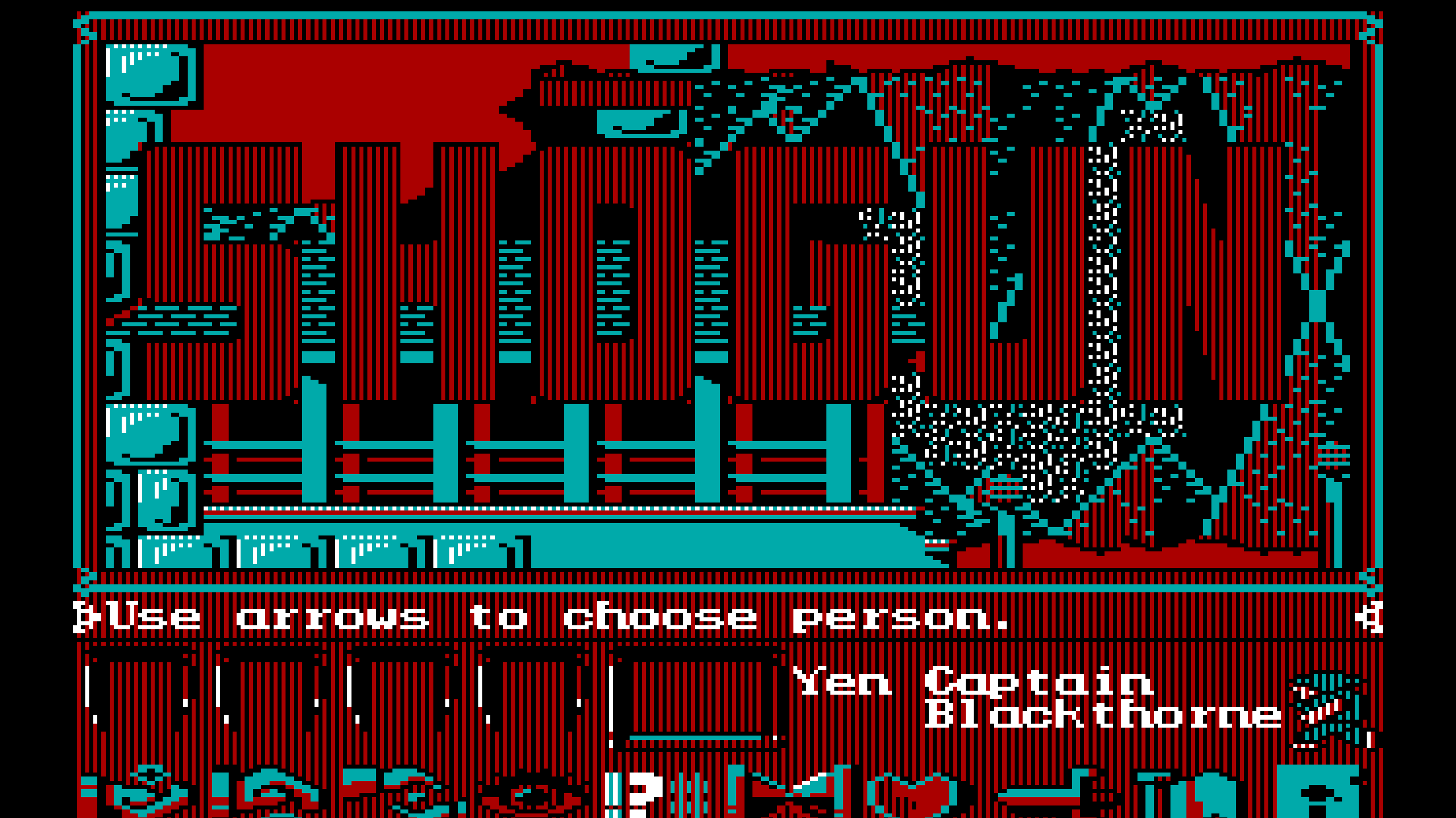
I remember my time with this game the way I think most people remember Woodstock: just a collection of images and sensory inputs that I can never hope to order. It is weird, I think unintentionally so, and for that reason I have much more affection for it than I do for its text adventure successor game.
That's not to say I like it. I'm not sure I can like anything of which I have zero understanding after spending over an hour with it, but I can't help but be pleasantly fascinated by anything that baffles me on some level.
Anyway, here's the part where I tell you about the game. Except no. Because I genuinely don't even know what the goal is here. Full disclosure: I played an emulated version of this game with no manual, which felt roughly equivalent to trying to land a passenger airliner using the Force.
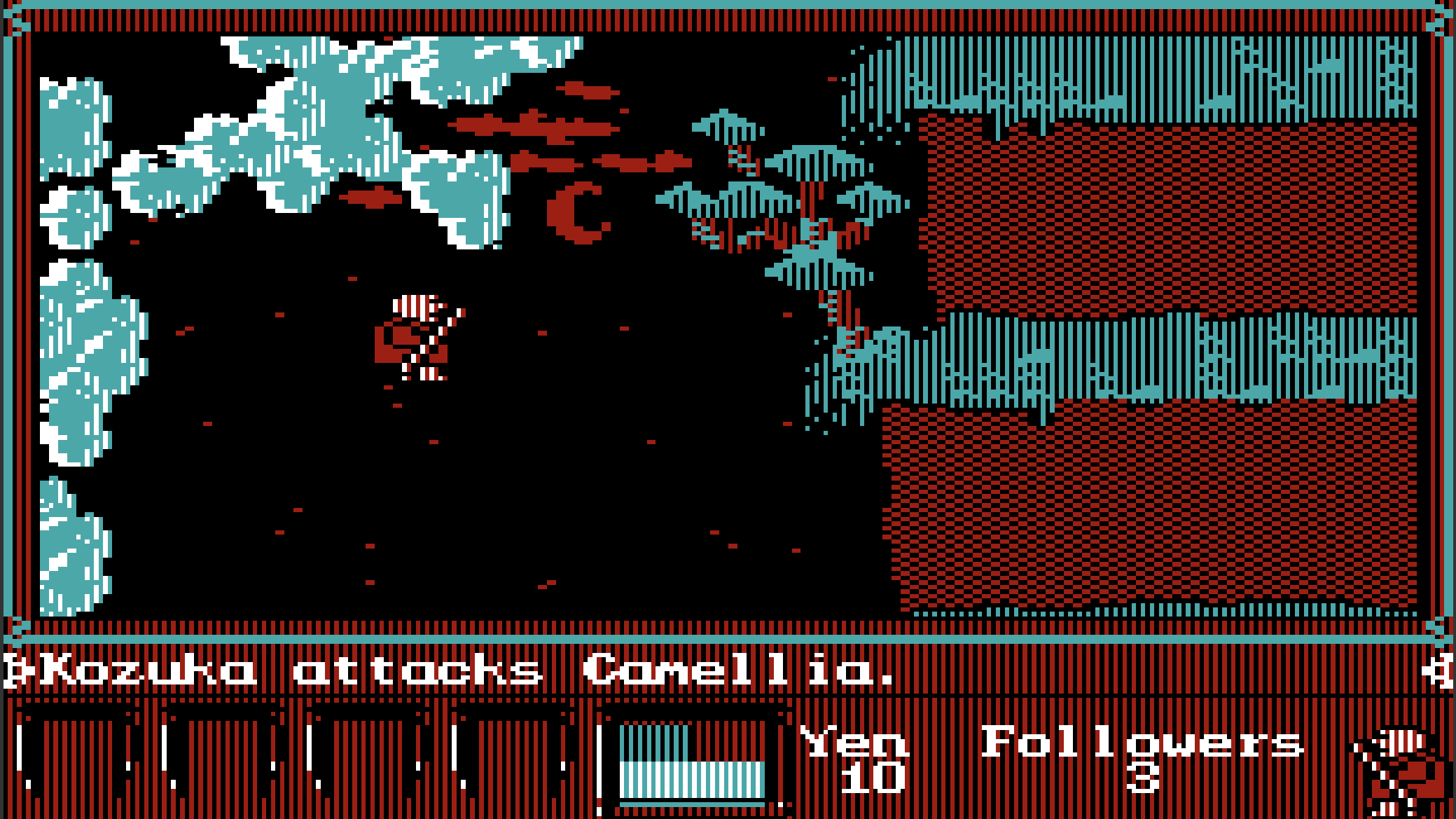
So here is a blow-by-blow of what I experienced: To begin, Mastertronic's James Clavell's Shogun asked me to select a character from a gallery of lords and samurai. Having not read the book, I had absolutely no idea who any of them were, nor did I understand what their titles (character classes?) meant. I settled on a samurai because samurai are cool, and I imagined the mechanics of hitting people with a sword would be clearer than whatever it is lords get up to. I've seen Ran, those guys' lives seem complicated and fratricidal to an above-average degree.
Anyway, I'm clearly an idiot, because playing as a samurai was absolutely no clearer than playing anyone else. 1986's Shogun is no text adventure: it dumps you in a kind of small open world and lets you wander the Earth. All the while, a sort of news ticker flicks across the bottom of the screen: "Camellia runs away!" it said the second I hit play, followed by "News from the Shoguns [sic] palace," then "Hachiman attacks Kozuka," then "Toranaga befriends Peregrine."
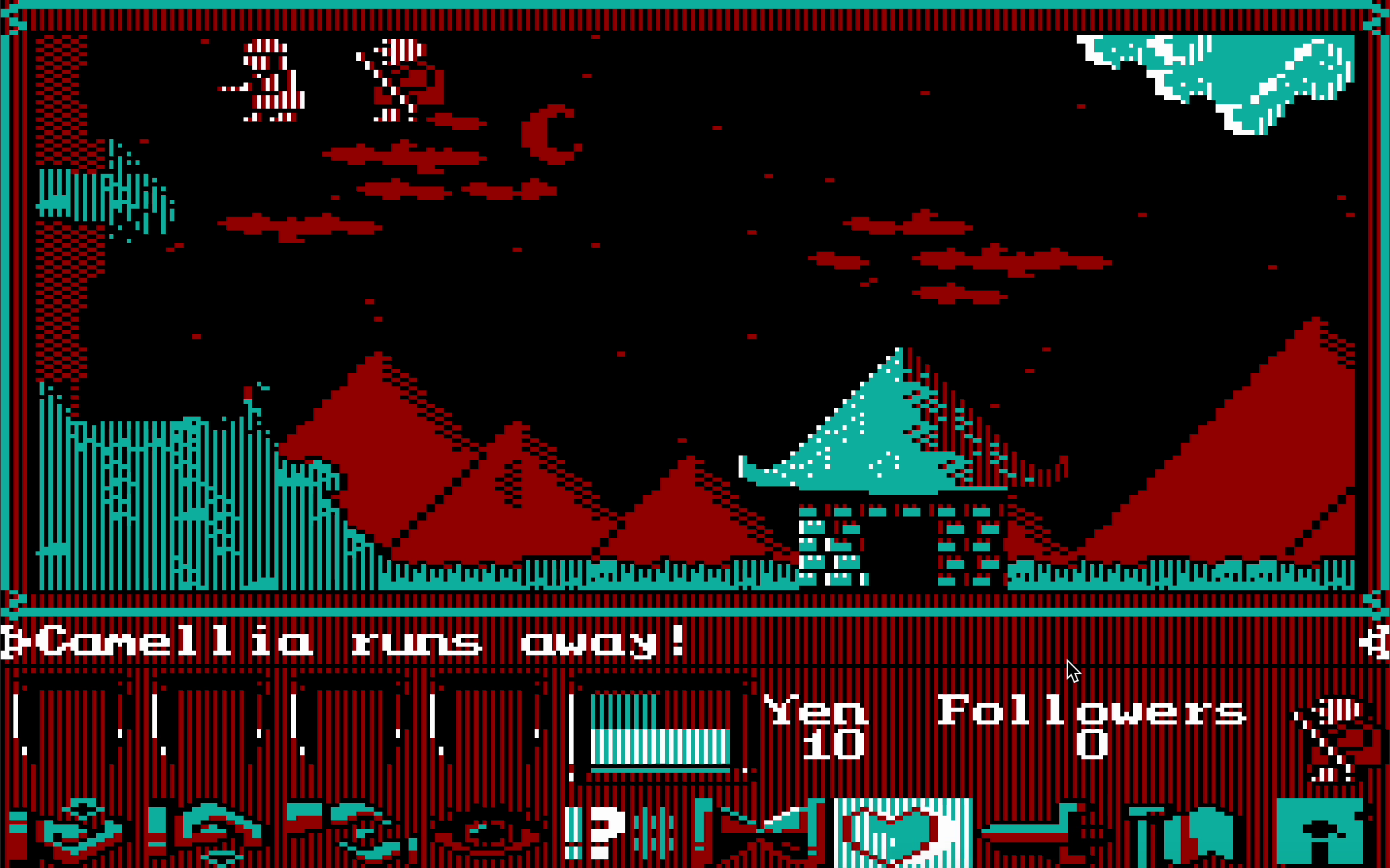
It all had the feeling of being present for an intense discussion in a language you don't fully understand. Something important is clearly happening and you should probably know what, but you don't have any of the tools necessary to achieve comprehension. So you just nod and hope for the best. "Muraji befriends Blood," eh? Well, great stuff. Um, keep up the good work.
Even disregarding the constantly-shifting ticker of inexplicable events, I was at something of a loss. A quick glance at some YouTube comments on an old gameplay video of Mastertronic's Shogun gave me some hints: My goal was apparently to collect followers, maybe 30 of them, and this would somehow make me win. Well, fine. I set about approaching the game's myriad roving NPCs and befriending them.
It all had the feeling of being present for an intense discussion in a language you don't fully understand
Along the bottom of the screen is a row of commands which play a pleasant sliding scale of notes as you scroll between them. I approached a man and tried to put them to use.
A quick aside: all of Mastertronic's Shogun's maps are laid out like side-scroller levels but let you move about them as if you're controlling things from a bird's eye view. Imagine 1-1 from Mario but you can go north, making it look like you're just walking up into the sky.
So, yes, I approached a man located slightly above the Moon and decided to rizz him into follower number one. I selected an icon which seemed to suggest an exchange of funds and picked an amount of 10 yen: which turned out to be all the money I had. I wasn't sure if I was giving this person 10 yen or asking for it from him, but the fact he responded with a beaming "Thanks!" suggests I literally gave this vagrant Moon-man my entire fortune.
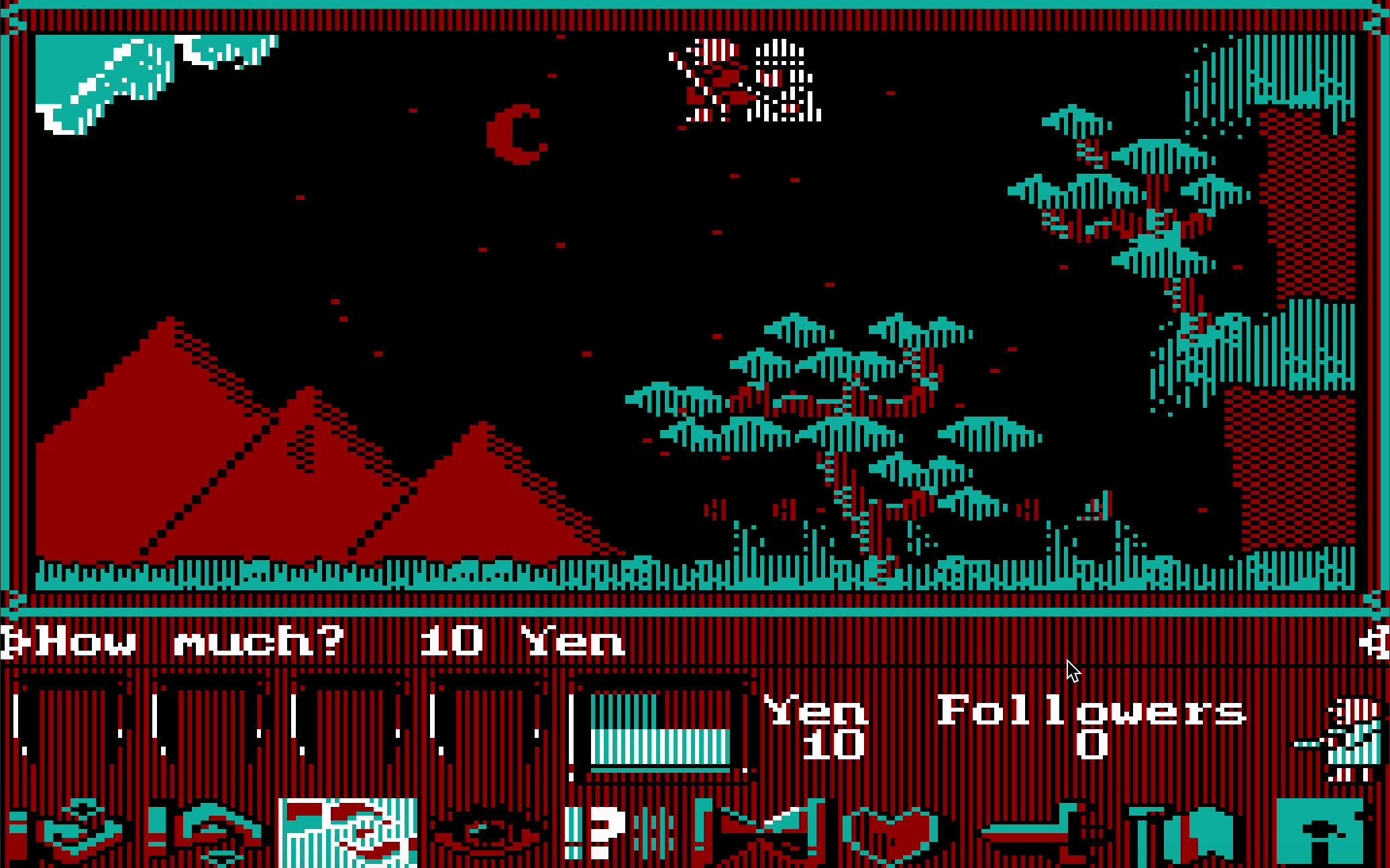
Anyway, that didn't seem to accomplish much beyond making that guy's day better, so I tried something else. I selected a speech bubble and scrolled through a list of potential commands, settling on "Protect". It seemed a great option! I would order him to protect me and that would be basically like having a follower.
One issue, though, was that I did not remember who I was, and I could apparently order this guy to protect literally anyone in Japan. I abandoned this plan almost immediately, settling on asking this nameless comrade and inheritor of the sum total of my life's wealth to protect someone named "Lady Mariko," who could probably do with it.
He agreed, which was remarkable, and I decided to try something else. Perhaps "Guard" would just default to guarding me, I wondered? It did not. It meant "Guard this area." My soldier friend—taking no issue with competing orders to guard both Lady Mariko and the Moon—agreed readily, and immediately exited the level at Doom-guy speed.
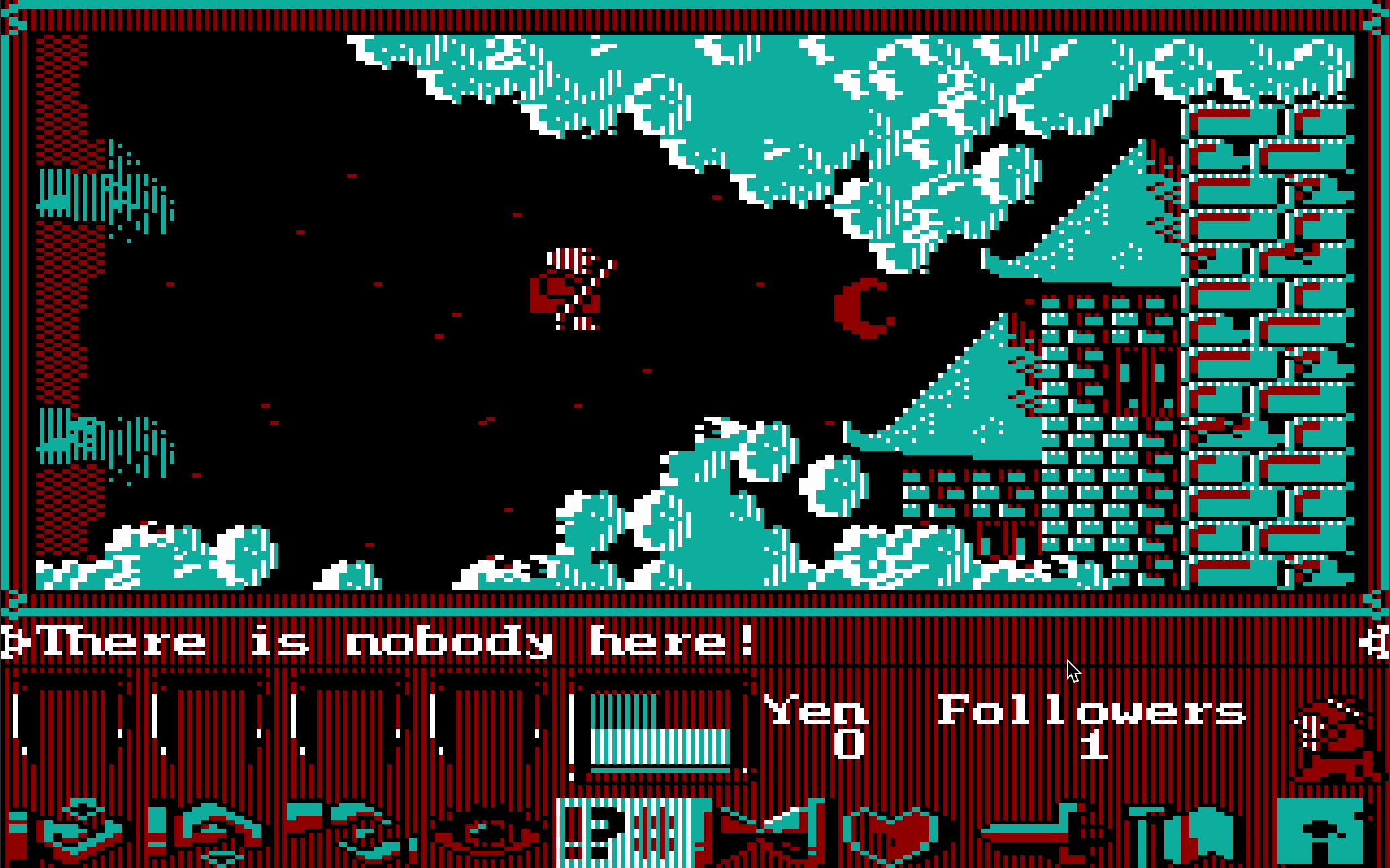
I wandered for a bit, more messages scrolling along the screen's bottom—"Blood attacks Moonlight! Moonlight runs away!"—feeling restive and impotent. At some point, I noticed that my followers counter had ticked up to two, which I felt strangely proud of despite having no grasp of how it had come to be, but eventually I lost someone while the screen told me there was "News from the West Palace." Perhaps the news was that I am a poor daimyō indeed.
I'd love to end on a climactic note. Some encounter with a rogue samurai who sliced me open over Hokkaido snow, but I honestly just wandered for a long time. Perhaps there's some message in that: a lion in winter tale for '80s gamers to grow on. Perhaps I'd just utterly failed to understand my role in the game at all. It is hard to say.
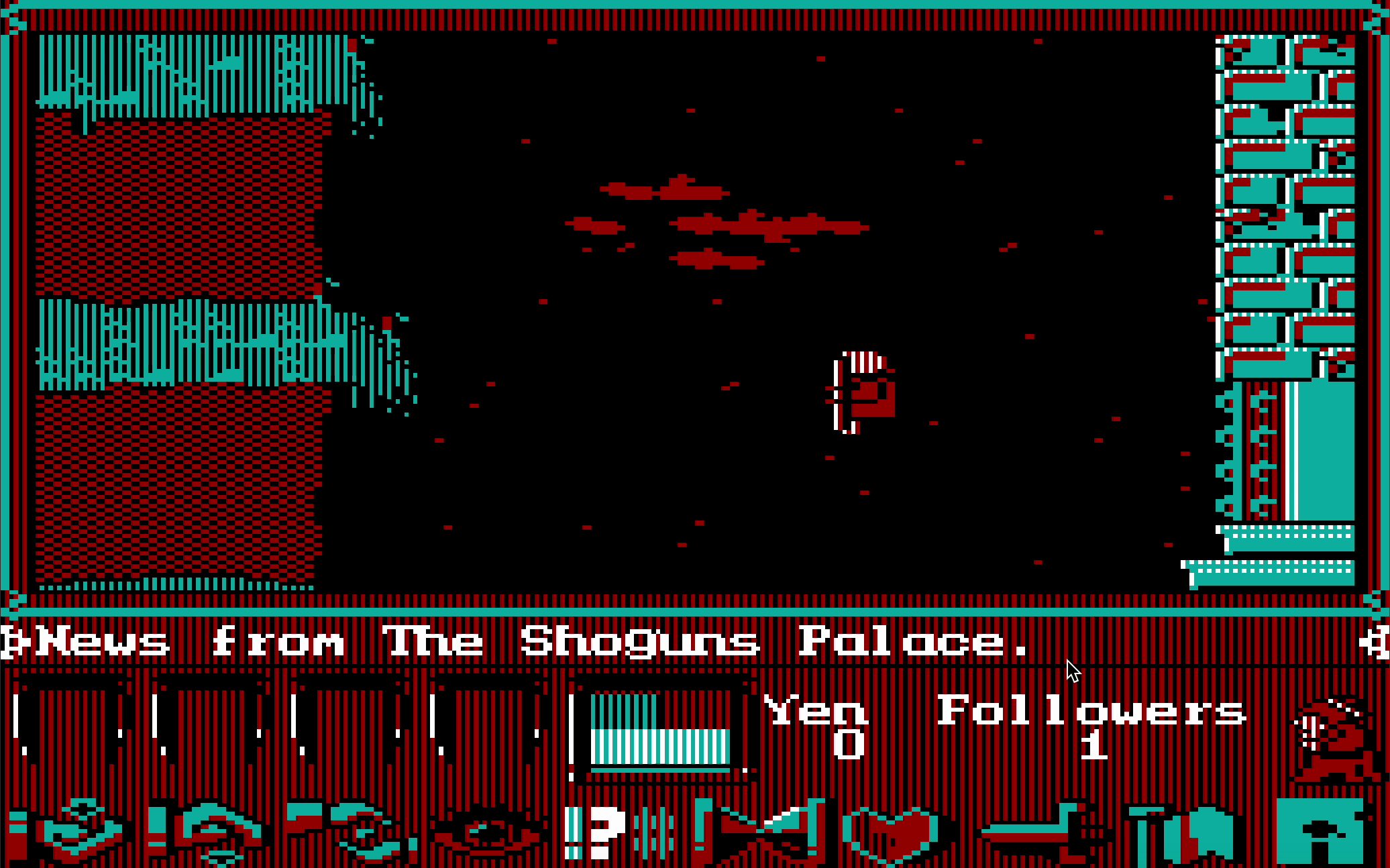
What I can tell you is that, if you wish to imagine Mastertronic's 1986 Shogun game, imagine a confused old man wandering through the sky forever. I suppose it's not all bad. Worse things happen at sea.







